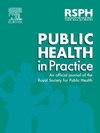Bridging abstraction and action: Phenomenology and public health research and practice
IF 1.9
Q2 PUBLIC, ENVIRONMENTAL & OCCUPATIONAL HEALTH
引用次数: 0
Abstract
Objectives
To explore the role of phenomenological research in public health, highlighting its contributions, challenges, and practical implications.
Study design
A narrative review informed by studies employing phenomenological methodologies published in the journals Public Health and Public Health in Practice.
Methods
Using the search keywords “phenomenology” and “phenomenological”, eligible original studies were identified in the journals Public Health and Public Health in Practice. The characteristics and findings of the studies were reviewed and discussed in relation to how phenomenology may lead to actionable public health interventions.
Results
A total of six studies were reviewed. Data collection methods across the studies included semi-structured interviews, audio and written diaries, and participatory approaches. Analysis techniques commonly used frameworks like Colaizzi’s method and interpretative phenomenological analysis (IPA). The studies addressed a range of public health issues, including barriers to postpartum diabetes screening, experiences of midwives during the pandemic, and strategies for chlamydia screening. Key findings included the depth of lived experiences, the impact of stigma, and the importance of culturally adapted interventions, albeit findings derived from small, purposive samples may face criticism regarding generalisability.
Conclusions
There is a notable paucity of phenomenological research in the field of public health. As a methodology, phenomenology enriches public health research and practice by illuminating subjective dimensions of the lived experience often overlooked by traditional metrics. Though challenging to execute, the methodology can achieve a balance between abstraction and actionable outcomes, advancing public health practices that are both empathetic and inclusive.
弥合抽象与行动:现象学与公共卫生研究与实践
目的探讨现象学研究在公共卫生中的作用,强调其贡献、挑战和实际意义。研究设计:采用现象学方法进行的研究,发表在《公共卫生》和《实践中的公共卫生》期刊上。方法以“现象学”和“现象学”为关键词,检索《公共卫生》和《公共卫生实践》期刊中符合条件的原始研究。就现象学如何可能导致可行的公共卫生干预措施,对这些研究的特点和结果进行了审查和讨论。结果共回顾了6项研究。研究中的数据收集方法包括半结构化访谈、音频和书面日记以及参与式方法。分析技术常用的框架如Colaizzi的方法和解释现象学分析(IPA)。这些研究涉及一系列公共卫生问题,包括产后糖尿病筛查的障碍、大流行期间助产士的经验以及衣原体筛查的战略。主要研究结果包括生活经历的深度、耻辱的影响以及适应文化的干预措施的重要性,尽管来自小样本、有目的的研究结果可能面临普遍性方面的批评。结论现象学在公共卫生领域的研究明显缺乏。作为一种方法论,现象学通过阐明经常被传统度量所忽视的生活经验的主观维度,丰富了公共卫生研究和实践。虽然执行起来具有挑战性,但该方法可以在抽象和可操作的结果之间取得平衡,促进既同情又包容的公共卫生做法。
本文章由计算机程序翻译,如有差异,请以英文原文为准。
求助全文
约1分钟内获得全文
求助全文

 求助内容:
求助内容: 应助结果提醒方式:
应助结果提醒方式:


